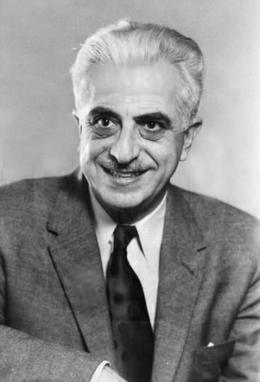Gregory G. Pincus facts for kids
Quick facts for kids
Gregory Goodwin Pincus
|
|
|---|---|
 |
|
| Born | April 9, 1903 Woodbine, New Jersey, U.S.
|
| Died | August 22, 1967 (aged 64) Boston, Massachusetts, U.S.
|
| Citizenship | United States |
| Alma mater | Cornell University Harvard University |
| Spouse(s) | Elizabeth Notkin (died 1988) |
| Children | 2 |
| Awards | Cameron Prize for Therapeutics of the University of Edinburgh (1966) |
| Scientific career | |
| Fields | Biology |
| Institutions | Harvard University Worcester Foundation for Experimental Biology |
Gregory Goodwin Pincus (born April 9, 1903 – died August 22, 1967) was an American biologist and researcher. He is known for his important work with hormones and how they affect the body.
Contents
Early Life and Education
Gregory Pincus was born in Woodbine, New Jersey. He was one of five children. His parents had moved to the U.S. from Eastern Europe. His father was a teacher and also edited a farm magazine.
Gregory was very smart, and his family thought he was a genius. He said that two of his uncles, who were scientists studying farming, helped him become interested in research.
He went to Cornell University and earned a degree in biology in 1924. After that, he studied at Harvard University. There, he taught zoology while also working on his advanced degrees.
Between 1927 and 1930, Pincus traveled to study at other famous places. He worked at Cambridge University in England and the Kaiser Wilhelm Institute for Biology in Germany. In 1930, he returned to Harvard University to teach about how living things work.
Important Research
Early in his career, Gregory Pincus started studying hormones. Hormones are special chemicals in the body that control many functions. He was especially interested in how hormones affect the reproductive systems of mammals, which include animals like humans.
In 1944, Pincus helped start a new research center. It was called the Worcester Foundation for Experimental Biology. This center was in Shrewsbury, Massachusetts.
He wanted to keep studying hormones and their connection to health problems. This included conditions like cancer, heart disease, and schizophrenia. By the late 1960s, many scientists from around the world came to this foundation. More than 300 researchers visited to take part in the important work happening there.
Personal Life
Gregory Pincus married Elizabeth Notkin in 1924. They had two children together. Elizabeth lived until 1988.
Awards and Recognition
Gregory Pincus received many awards for his scientific work. Some of these included:
- The Oliver Bird Prize in 1960.
- The Julius A. Koch Award in 1962.
- The Cameron Prize for Therapeutics of the University of Edinburgh in 1966.
- The American Medical Association’s Scientific Achievement Award in 1967.
He was also recognized for creating the Laurentian Hormone Conference. This was a special meeting for endocrinologists. These are doctors and scientists who study the endocrine system and its hormones. Pincus led this conference, where experts from all over the world gathered to discuss new discoveries about hormones.
Later Years and Death
Gregory Pincus died in 1967 at the age of 64. He passed away in Boston, Massachusetts. The cause of his death was a type of blood cancer called myeloid metaplasia.
His funeral was held on August 25, 1967, in Worcester, Massachusetts.

